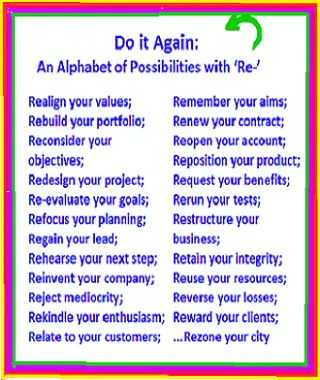Review the Prefix ‘Re’
The prefix ‘re’ is extremely common-- and easy to understand, as it almost always means ‘again’ or ‘back.’ Some examples: we rewind videos so we can return them to video rental stores. We rewrite and then revise important reports, reorganizing or rewording parts that might be confusing. Cities rebuild using urban renewal plans; they revive areas that have been declining.
Match Words with the Prefix ‘Re-‘ with their Meanings
Some words beginning with prefixes are obvious from the meaning of the base combined with the prefix. This is especially true with the prefix ‘re-’, which is used with many basic English words.
You probably know many of the common English roots or base words below. Here are the base forms of some Latin roots you might need:
- grade/gress- step, to take steps
- vers/vert- to turn
- viv- to live
- volve- to roll, turn over
In the practice below, match the words on the right with their (simplified) meanings on the left. Then read the rest of the page for an explanation of a few words with the prefix ‘re’ that are not so easy to guess.
Other prefix and root combinations are not so obvious. Often they have changed from their original meaning over time (like revolution, above.) However, if you understand the meaning of the prefix and of the root, you may be able to come close to the meaning of the new word. Use the context to help you too.
Examples using the prefix 're':
1. ‘-Ject’ comes from a root meaning to throw. So ‘reject’ is to throw back, or refuse to accept something. (Eject is to ‘throw something out of’ and inject is to ‘throw something into.’ A nurse gives patients an injection of vaccine to prevent them from getting some diseases.)
2. ‘-Strict’ comes from a Latin root meaning narrow or tight. So a restriction is something that holds someone back, under tight control. Constrict has a similar meaning-- to hold together or compress tightly, and constraint and restraint come from the different forms of the same root. They all refer to tight controls or limits.
3. ‘Bellum’ is the Latin word for war. So to rebel means to revolt or fight against something. (Bellicose-- ‘warlike’ and belligerent are from the same root.) So if a young man rebels against his parents’ restrictions, he wants to fight the limits he thinks are too tight.
For classroom use, much of the information and practice of the prefix 're-' above, as well as of other common prefixes, is also available as worksheets in the prefix packet or root and affix packet and bundles on Root, Prefix, and Suffix Worksheets.
You might also want to practice other common prefixes (com-, ex-, in-, sub-, trans-, etc.), study negative prefixes or practice them, or look at a more complete list of prefixes.
Home> Roots, Prefixes and Suffixes> The Prefix ‘Re-.‘
Didn't find what you
needed? Explain what you want in the search box below.
(For example, cognates, past tense practice, or 'get along with.') Click to see the related pages on EnglishHints.
| site search by freefind | advanced |






